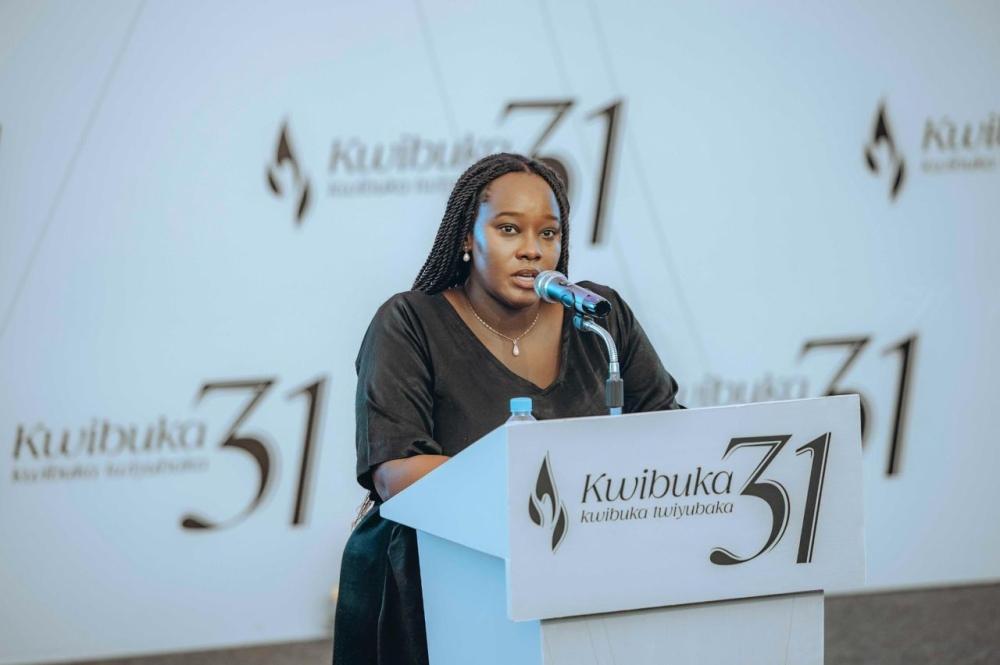Africa-Press – Rwanda. Rwanda Governance Board Chief Executive Officer Doris Uwicyeza Picard has called on civil society, faith-based organisations, and international NGOs to deepen their engagement in promoting remembrance, truth, and justice as well as the fight against denialism of the 1994 Genocide against the Tutsi.
Speaking during commemoration event held at the Kigali Genocide Memorial on Friday, May 2, Uwicyeza reminded the civil society, faith-based organizations that their role is “indispensable” especially in the ongoing struggle against genocide ideology and the distortion of historical truth.
“You are the voice in the village and the voice on the global stage,” she said during the event organizer jointly with civil society and faith-based organizations.
“Locally, your proximity to communities gives you unique access to educate, sensitize, and mobilize. Internationally, you must use your platforms, research, networks, and influence to dismantle genocide denial and confront false narratives wherever they arise.”
“Let today ignite bold, sustained action. Let it drive strategies, partnerships, and programs that protect truth, honor memory, and uphold justice. Let us reach young people with our stories, lest silence be interpreted as consent,” she added.
The event brought together members of the Rwanda Civil Society Platform (RCSP), the Network of International NGOs (NINGOs), the Rwanda Inter-Religious Council (RIC), UNDP Rwanda, and other stakeholders. The delegation laid wreaths at the memorial site, where over 250,000 victims of the 1994 Genocide against the Tutsi are buried, and toured the museum that chronicles the atrocities and their root causes.
Uwicyeza said that Genocide denial is “not merely a distortion of history” but a danger in “motion” because “it seeks not only to erase memory, but to reopen wounds and threaten the fragile fabric of reconciliation.”
“Sadly, Genocide denial persists, within Rwanda and beyond our borders. It festers on social media. It is amplified by so-called activists and foreign organizations masquerading as defenders of rights.”
“Your efforts are seen, they are felt, and they are deeply appreciated. The Government of Rwanda stands with you in this ongoing fight—for remembrance, for truth, and for a Rwanda, and a world, free of genocide ideology,” Uwicyeza said.
Sheikh Musa Sindayigaya, the Mufti of Rwanda, said this year’s commemoration gave them yet another commitment to teach Rwandans values that unite people and encourage collective work, especially among the youth.
He noted that it was not an issue of debate that faith-based organizations were complicit in the 1994 Genocide against the Tutsi, and even some prominent religious leaders were convicted for their participation in the killings.
“I understand that no religion teaches people to engage in genocide,” Sindayigaya said. “These were leaders who went astray, were not committed to love, purity, and ultimately left behind bad deeds.
“We have learnt a lesson, and we’re now working closely with our government to do good collectively for all Rwandans. We’re looking forward to doing even better,” he said.
However, Sheikh Sindayigaya acknowledged a weakness where churches and mosques are still lagging in teaching lessons that reflect Rwanda’s specific context. He noted that they often rely on general scriptures that sometimes don’t address the realities and needs of Rwandan society, especially regarding unity and reconciliation.
“We understand that those lessons are not providing solutions to what is truly needed, and that is our weakness, yet we gather a large number of Rwandans across our respective religious beliefs. I’m convinced that we can do better and work toward the common good,” he added.
Theoneste Murangira, the Chairperson of the RCSP, said it is “embarrassing beyond measure” that some civil society organizations were involved in the Genocide. However, this has been a lesson to memorize and they are committed to ensuring that “Never Again” is not just a phrase, but a lived reality.
“This goes hand in hand with ensuring the well-being of people and engaging them in positive acts,” he said.
For More News And Analysis About Rwanda Follow Africa-Press






